What Is A Simple Skin Care Routine For Beginners?
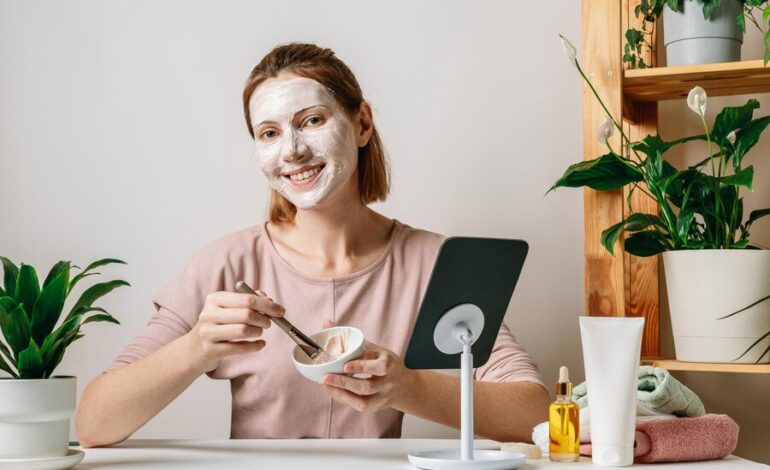
Skin Care Routine For Beginners :Creating a basic and working skin care plan is key to getting radiant and healthy skin. It doesn’t matter what skin type or issues you face. This guide will show you how to start a skincare routine that fits you. You will learn about picking the best cleaners, moisturizers, and protecting your skin from the sun.
First, figure out what your skin type is and what issues you want to tackle. Then, choose the best products to help your skin. By following this advice regularly, you can achieve truly beautiful skin.
Key Takeaways
- Understand your skin type and address your specific skin concerns to build an effective skincare routine.
- Choose the right cleansers, moisturizers, and sun protection products to meet your skin’s needs.
- Develop a consistent skincare routine to achieve healthy, glowing skin over time.
- Avoid irritation and allergic reactions by starting with a simple, gentle skincare regimen.
- Be patient and persistent in your skincare journey to see the best results for your skin.
Understanding Your Skin Type
To set up a good skincare routine, it’s vital to know your skin type and skin concerns. Figuring out what type of skin you have and any issues it has helps you pick the best products. This ensures you get great results.
Also Read : How Can I Build A Budget friendly Skin Care Products List?
Identifying Your Unique Skin Concerns
Look closely at your skin. Check for things like how much oil your skin makes or if it’s easy to get red or irritated. These clues help you figure out your skin type:
- Oily skin: looks shiny, gets acne easily, and feels oily.
- Dry skin: feels tight, looks flaky, and may be dull.
- Sensitive skin: gets irritated easily, shows redness, or feels itchy.
- Combination skin: has an oily T-zone but is dry elsewhere.
- Normal skin: feels balanced, neither too oily nor too dry.
Also Read : What Fruits Are Good For Dry Skin?
Determining the Right Products for Your Skin
After knowing your skin type, you can focus on the main issues. These could be acne, fine lines, roughness, or dark spots. Choose products like cleansers and moisturizers made just for your skin’s needs. This is key for the best results.
Also Read : Which Vegetable Is Best For Glowing Skin?
“Knowing your skin type and concerns will help you determine the right products and ingredients to address your needs.”
Understanding your skin type and skin concerns is the first step to a personalized routine. This routine will meet your skin’s specific needs. The goal is to get your skin looking and feeling great.
Also Read : What Are The Best Natural Remedies For Eczema?
The Importance of Cleansing
Cleansing is vital for a good skin care routine. It’s the first step in removing dirt, oil, and impurities. This prepares your skin to absorb other products better. Clean skin is the starting point for health and glowing skin.
Also Read : What Are The Symptoms Of Skin Cancer?
Choosing the Right Cleanser for Your Skin
Each person’s skin is different, so the right cleanser matters. For those with acne-prone or oily skin, a gentle cleanser with salicylic acid or benzoyl peroxide is recommended. This helps cleanse and control excess oil.
If your skin is dry or sensitive, go for a moisturizing, fragrance-free formula. It keeps your skin hydrated without irritation.
It’s important to avoid harsh, medicated cleansers regardless of your skin type. They can disturb your skin’s balance. Instead, choose a non-medicated, gentle cleanser for a clean and healthy skin.
“The right cleanser can make all the difference in your skin care routine. It’s the foundation that sets the stage for the rest of your products to work their magic.”
Balance in cleansing is key. Your skin should be clean but not stripped of moisture. With the right product, you can thoroughly cleanse your skin. It will leave it refreshed and primed for your next skincare steps.
Moisturizing: A Key Step
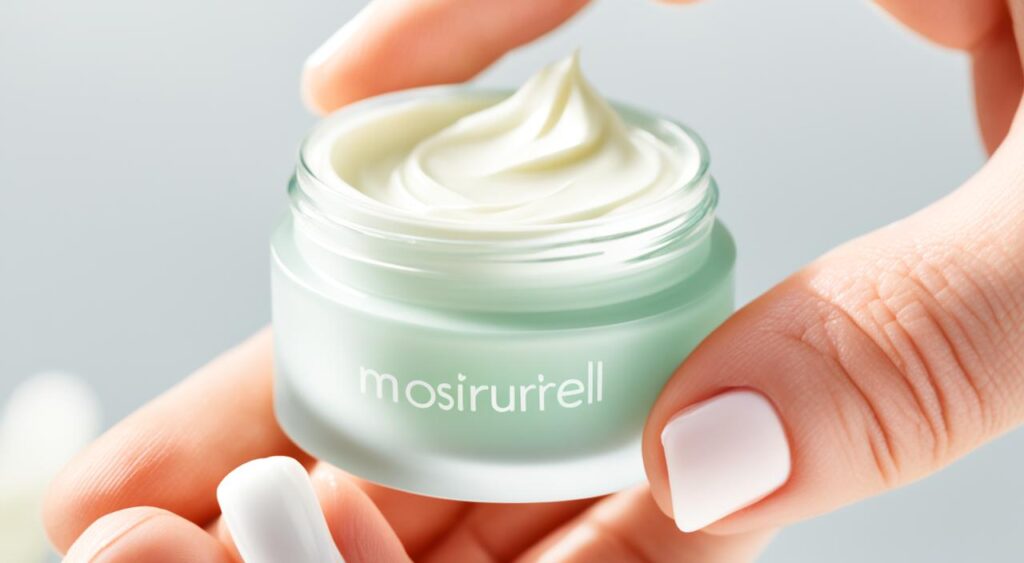
Moisturizing is key for healthy skin. It keeps your skin full of moisture, looking vibrant. Choosing the right moisturizer for your skin type is crucial for a glowing look.
If you have dry or sensitive skin, go for moisturizers with ceramides, hyaluronic acid, and glycerin. These ingredients deeply moisturize and protect your skin. They help keep your skin barrier strong, holding moisture in all day.
Those with oily skin might prefer a oil-free option. This can help cut down on oil and keep pores from getting clogged. Light, oil-free moisturizers often include ingredients to control oil. Your skin will feel fresh and even.
Proper moisturizing does wonders for your skin, no matter your type. The right moisturizer helps your skin stay hydrated and fight off damage. Choosing one that fits your needs and using it every day is important.
“Hydration is the foundation of healthy, radiant skin. Investing in the right moisturizer can truly transform your complexion.”
Moisturizing is essential for good skin care. It’s a step that should be part of your daily routine. Doing this helps your skin look and feel great, meeting its specific needs.
Sun Protection: An Essential Part of Any Routine

Shielding your skin from the sun’s UV rays is key in keeping it healthy. UV radiation can cause signs of aging, like wrinkles and sun spots. It also raises the chance of getting skin cancer. For protection, use a broad-spectrum sunscreen. Make sure it’s at least SPF 30 every day.
The Benefits of Mineral and Chemical Sunscreens
Choosing the right sunscreen matters:
Mineral sunscreens have zinc oxide or titanium dioxide. They physically block UV rays from your skin. Chemical sunscreens absorb the sun’s energy. Ingredients like avobenzone keep your skin safe by preventing damage. They protect your skin in different ways.
If your skin is easily irritated, you might prefer mineral sunscreens. They are gentle. Chemical sunscreens are lighter and easier to use. They blend well without leaving a white cast on your skin. It’s smart to think about what works best for your skin when picking a sunscreen.
“Protecting your skin from the sun is one of the most important steps in any skin care routine. It helps prevent premature aging, sun damage, and the risk of skin cancer.”
Using sunscreen daily is crucial for healthy, young-looking skin. It guards against the sun’s negative effects. This lets you keep a glowing and healthy complexion.
Exfoliation: Revealing Brighter, Smoother Skin
Exfoliation is key in any good skin care routine. It removes dead skin cells to show off a glowing, smooth look. You can exfoliate in two main ways: through physical methods or chemical ones.
Physical vs. Chemical Exfoliation
Physical exfoliation means using something to scrub your skin. This could be a scrub or a cleansing brush. On the other hand, chemical exfoliation uses special acids like alpha hydroxy acids (AHAs) and beta hydroxy acids (BHAs). These acids take away the bonds between dead skin cells without any scrubbing.
AHAs, for example, glycolic acid, are mixed with water. They’re great for making dull and rough skin feel better. BHAs, such as salicylic acid, mix with oil. They dive deep into your skin to fight against acne and keep your pores cleaner.
When starting to exfoliate, go slowly. Both kinds of exfoliation can bother sensitive skin types. Gradually up the amount you exfoliate to see what works best for you.
“Exfoliation is a game-changer in achieving a brighter, more radiant complexion. It’s a simple yet powerful step that shouldn’t be overlooked.”
If you make exfoliation a regular part of your routine, your skin will shine. Make sure to pick the method that’s best for your skin and how often you do it. Always listen to what your skin is telling you.
Serums and Masks: Boosting Your Routine
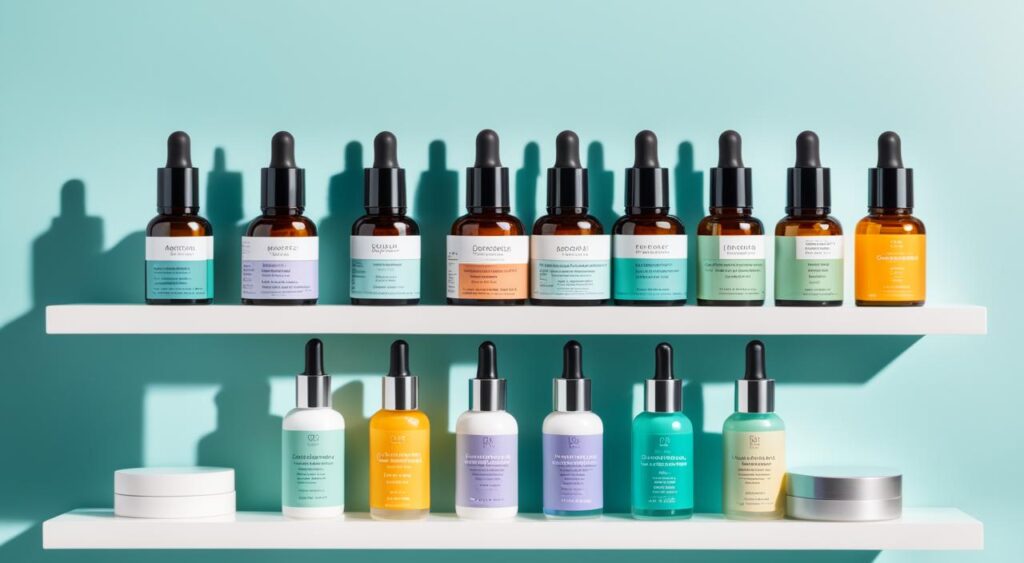
After the basics like cleansing and moisturizing, add serums and face masks. These target skin concerns directly. Serums pack a punch of stuff like vitamin C for glow or hyaluronic acid for deep hydration. Masks give skin a special treat, like extra hydration or calming.
Adding new skincare products slowly helps your skin get used to them. This makes sure your skin is happy with the new stuff. It helps you get a radiant, youthful, and balanced look over time.
Serums: Concentrated Skin Boosters
Serums have a lot of active ingredients meant for various skin issues, from brightening to anti-aging. Pick a serum based on what your skin needs. For instance, a vitamin C serum fights dull skin, and hyaluronic acid keeps your skin super hydrated.
Masking for Optimal Results
Masks are great for a deeper skincare treatment. They can help with different skin issues. If you need to clear your pores, a clarifying mask is the way to go. For dry skin, an hydrating mask works wonders. Or you can calm your skin with a mask that has botanical extracts or essential oils.
| Serum Concerns | Mask Concerns |
|---|---|
| Brightening | Hydration |
| Anti-aging | Clarification |
| Acne-fighting | Calming |
| Pore Minimizing | Exfoliation |
Take your time introducing new skincare products to see what works. With the right serums and face masks, you can reach your skin goals.
“Serums and masks can change the game, offering focused care to tackle your personal skin issues.”
skin care routine for beginners
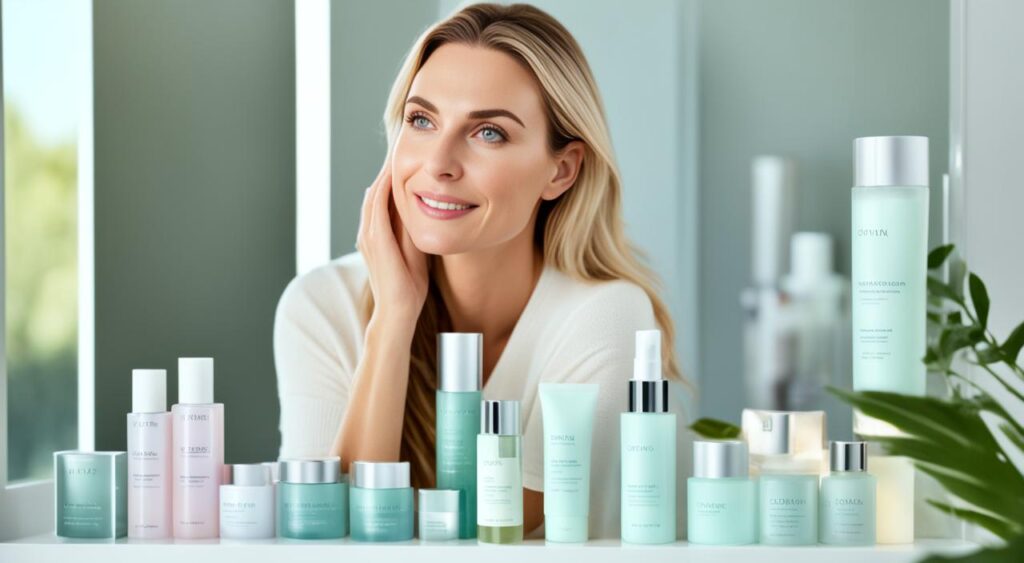
Starting a skin care routine can be tricky for beginners. But, it’s simple if you focus on the basics. Start with cleansing, moisturizing, and protecting your skin from the sun. These steps will help you get clear and glowing skin.
In the morning, protect your skin from the day ahead. Cleanse your face gently to remove night oils. Then use an antioxidant serum. This serum will fight off skin-damaging free radicals. Finish by putting on sunscreen with at least SPF 30.
At night, it’s all about cleaning your face from the day. Start by removing makeup with a gentle product. Then, wash your face with a mild cleanser. After that, use a thick moisturizer or night cream to help your skin repair as you sleep.
As your skin gets used to this routine, you can add more steps. You might want to use chemical exfoliants or targeted serums for specific skin issues. Just be sure to add new products slowly and one by one.
Remember, the secret to good skin care is not products, it’s consistency. Stick to your routine, and give your skin time to show results. Stay dedicated, and you’ll soon have the healthy, glowing skin you’re working for.
| Morning Routine | Evening Routine |
|---|---|
|
|
“Simplicity is the ultimate sophistication.” – Leonardo da Vinci
Stick to the basic skin care routine for beginners to see your skin improve. Your skin is unique, so listen to it. Pay attention to how it reacts as you add new products. With regular care and some experimenting, you’ll find the perfect skincare routine for you.
Less Is More: Keeping It Simple
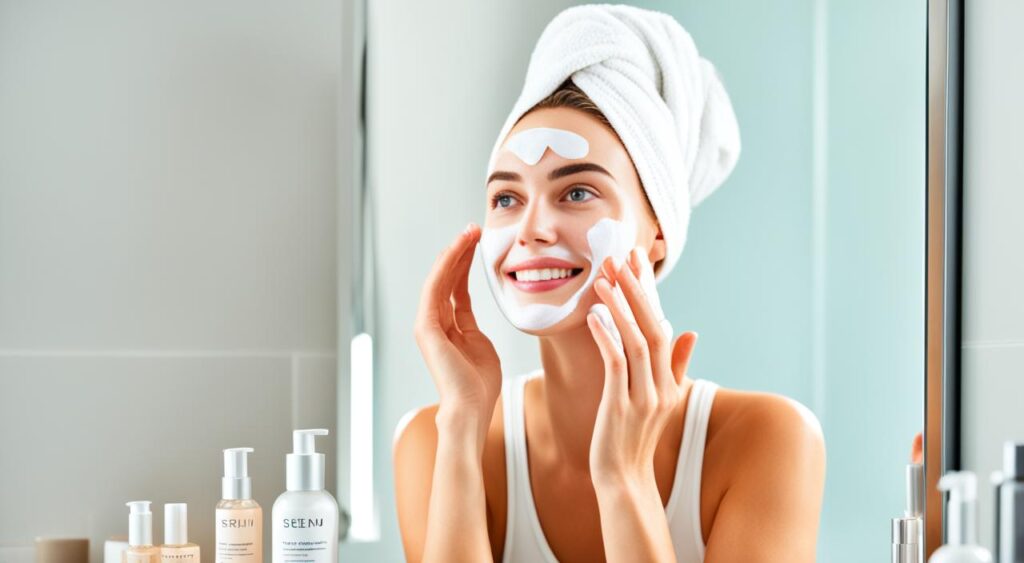
In skin care, remember: less is often more. Use simple products with key ingredients. Opt for fragrance-free, non-irritating formulas, especially if you have sensitive skin. When introducing new products, do it slowly, one at a time. This avoids irritation or allergic reactions. By keeping your routine simple, you’ll do better in the long run.
Avoiding Irritation and Allergic Reactions
For a simple skin care routine, it’s vital to avoid irritation and allergic reactions. This is key for anyone with sensitive skin. Such individuals can easily react badly to certain ingredients.
Stick to fragrance-free, non-irritating products to keep your skin healthy and happy. When adding new products, do it cautiously. Starting slowly and using them one at a time helps your skin adjust. This lowers the chance of irritation or allergic reactions. Don’t rush into using too many new products at once. It could stress your skin.
“The key to a successful skin care routine is simplicity. Stick to the essentials and avoid overcomplicated formulas or too many products at once.”
Keep it simple and stay aware of your skin’s needs. This approach helps you set up a skin care regimen that really works for you. It minimizes the risk of irritation or bad reactions.
Consistency and Patience: The Keys to Success

To get a glowing, healthy skin, you need to be dedicated. Keeping up with your skin care daily can lead to major improvements. Consistently following your routine and being patient helps your skin get used to new products.
Stick with the same skin care steps twice a day. This keeps your skin happy. Avoid trying many new things at once because it can upset your skin.
It’s also vital to be patient. Your skin needs time, about 2-3 months, to adjust to something new. Stick to a routine and allow time to see results – quick changes won’t help and can make things worse.
- Maintain a consistent skin care routine, performing the same steps morning and night.
- Don’t experiment with too many new products at once, as this can disrupt your skin’s balance.
- Allow at least 2-3 months for your skin to adapt to a new product or routine before making changes.
With consistency and patience, you’ll figure out what really works for your skin. This approach helps you develop a skin care plan that brings out the best in you.
“Consistent, thoughtful skin care is the key to long-term skin health and beauty.”
Also Read: How Does A Night Routine Benefit Your Skin Care Regimen?
Conclusion
Creating a basic and successful skin care routine is vital for getting healthy, glowing skin. This applies to all skin types and skin issues. Knowing your skin’s needs and picking the right products is crucial. Being consistent with your routine leads to beautiful skin.
Start with the essentials like washing, moisturizing, and protecting from the sun. Then, add more steps slowly. With patience and a personalized strategy, you will reach your goal of having a healthy, beautiful complexion.
Follow a simple skin care routine that’s right for you to reach your skin goals. Consistency and patience are what you need. Enjoy the process and the amazing change in your skin.
FAQs
Q: What is a skincare routine?
A: A skincare routine is a set of steps and products used to take care of the skin on a daily basis, typically involving cleansing, toning, moisturizing, and protecting the skin.
Q: How can I start a skincare routine for beginners?
A: To start a skincare routine for beginners, identify your skin type, choose suitable products, and follow basic steps like cleansing, toning, moisturizing, and applying sunscreen.
Q: Why is it important to identify your skin type before starting a skincare routine?
A: Identifying your skin type is crucial to determine the appropriate skincare products and routines that will work best for your specific skin concerns and needs.
Q: What are some basic steps to include in a morning skincare routine?
A: A morning skincare routine typically involves cleansing, applying toner, moisturizing, and protecting the skin with sunscreen before starting your day.
Q: How can I determine the best skincare products for my specific skin concerns?
A: It is recommended to consult with a dermatologist or skincare specialist to determine the most suitable products for your specific skin concerns such as acne-prone skin, dryness, sensitivity, or aging.
Q: What are some tips to keep your skin glowing and healthy?
A: To maintain glowing and healthy skin, make sure to moisturize regularly, protect your skin from the sun, stay hydrated, eat a balanced diet, and follow a consistent skincare routine.
Q: How can I build a skincare routine that works for my oily skin?
A: For oily skin types, focus on using oil-free and non-comedogenic products, include ingredients like salicylic acid or niacinamide, and follow a consistent routine to control excess oil production and prevent breakouts.
